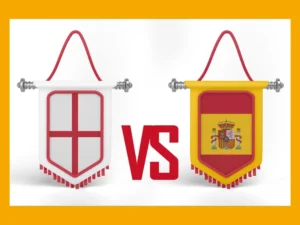Studying Spanish as an English speaker has some advantages when it comes to guessing a word or verb, as they both derive from Latin. There are a few examples of 15 false friends in Spanish to know that trip up even the most confident of Spanish speakers – so we’re here to make sure you are ahead of the game! Let’s take a look:
- Constipated – Constipado (to have a cold)
Even though these two are both related to health, they’re two very different things! Our advice to you would be to learn the difference as it could end with some awkward conversations with the pharmacist. Let’s be honest, you can’t cure constipation with Lemsip Cold and Flu.
- Exit – Éxito (success)
As an English-speaking person not knowing Spanish, the most obvious way to guess a word in Spanish we don’t know is to make an English word sound as Spanish as possible! Sometimes (although very rarely) it works! But in this case, you can end up looking a little silly when you ask someone “¿Dónde está el éxito?” when you’re inside the Primark on ”Gran Vía” and looking for the “Salida”.
- Library – Librería (bookshop)
This one isn’t too bad if you mix up as they are both places that stock books, the only difference is at the “librería” you have to pay for them and at the “biblioteca” you can take them out on loan. An easy one to mix up, but a good one to remember.
- Bomber – Bombero (firefighter)
If you’re ever in a situation where there is a fire and someone says “llamar a los bomberos”, don’t be alarmed! Bombero is the word for firefighter, not someone who plants a bomb!
- Carpet – Carpeta (folder)
When you hear the word “carpeta” in Spanish, just know they’re not talking about a floor covering. You’re more likely to hear this word at work when you’re asked to save something in a folder, and you’ll need the word “alfombra” to talk about a carpet.
- College – Colegio (school)
Though they sound the same and in some countries college can mean University. In Spain, you might get a strange look being 24 and telling someone you’re in “Colegio”, which means high school.
- Molest – Molestar (to annoy)
If a Spanish person tells you “es muy molesto” don’t be alarmed, it doesn’t mean what you think it does! They are simply just telling you that something is annoying! Although if somebody tells you you’re annoying, it’s not a great thing either!
- Red – Red (network)
In Spanish, ”Red” means network (like the internet), unlike the word red, referring to the colour in English.
- Soap – Sopa (soup)
When you’re at a restaurant, always remember that the Sopa is served as a primero and the soap is to wash your hands! You may get a strange look if you come back from the toilet and tell the waiter there was no sopa instead of jabón.
- Assist – Asistir (to attend)
If somebody asks you “¿Vas a asistir a la fiesta?”, it may seem like they are asking you to help out at the party, but they’re simply asking if you’ll be going as a guest.
- Pie – Pie (foot)
You’ll definitely get a strange look if you ask someone; “¿Te gustan los pies?” when eyeing up the desserts menu after dinner! You should ask “¿Te gustan las tartas?” instead.
- Embarrassed – Embarazada (pregnant)
A very common and very embarrassing mistake is to say you’re “embarazada“, instead of “avergonzada”. It’s a bit of a rite of passage for Spanish learners to get this mixed up at least once!
- Bizzare – Bizarro (brave)
This is a great example of words that look very similar but have very different meanings.
- Condescend- Condescender (to agree)
In Spanish “condescender” means to agree but in English, it means to be patronising. Both words look similar but both have very different meanings.
- Preservatives – Preservativo (condom)
The food at the Carrefour bio market is low in preservatives not preservativos! This is definitely one of the more important false friends to keep an eye out for!
There are many more than 15 false friends in Spanish than the ones on this list. Our advice to you is to learn the differences and make the mistakes as you will learn from them! Visit the False Friends dictionary to get to know many others.
Just like any other skill, learning a new language requires patience and lots and lots of practice! Making mistakes at the beginning is inevitable, even some of the most advanced speakers make lots of mistakes but it is about learning from them, being confident and being consistent.
The best way to learn a new language is to completely immerse yourself. We offer Intensive Spanish courses in Madrid, which are taught by native teachers that will give you that extra boost that you need.
Don’t forget to follow us on Instagram and Facebook to see all our future content related to all things Spanish and Madrid! Or drop by our school in the barrio Salamanca to see where we are and what we’re all about!







